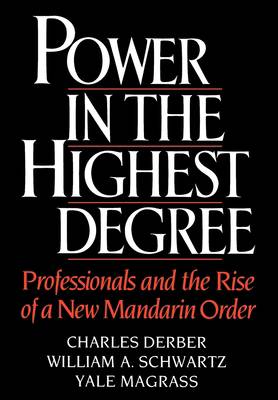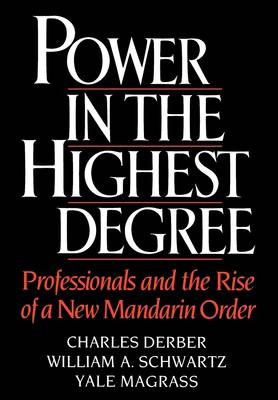
Bedankt voor het vertrouwen het afgelopen jaar! Om jou te bedanken bieden we GRATIS verzending (in België) aan op alles gedurende de hele maand januari.
- Afhalen na 1 uur in een winkel met voorraad
- In januari gratis thuislevering in België
- Ruim aanbod met 7 miljoen producten
Bedankt voor het vertrouwen het afgelopen jaar! Om jou te bedanken bieden we GRATIS verzending (in België) aan op alles gedurende de hele maand januari.
- Afhalen na 1 uur in een winkel met voorraad
- In januari gratis thuislevering in België
- Ruim aanbod met 7 miljoen producten
Zoeken
Power in the Highest Degree
Professionals and the Rise of a New Mandarin Order
Charles Derber, Yale Magrass, William A Schwartz
Hardcover | Engels
€ 106,95
+ 213 punten
Omschrijving
Lawyer, doctor, scientist--these are the jobs Americans commonly cite when asked to list the most prestigious occupations. The word "professional" today implies expertise, authority, and excellence. To do a job professionally is to do it well. Yet in a society in which knowledge has become a prized asset and an advanced degree the ticket to wealth and power, the rise of professionalism has a darker, more ominous side.
Power in the Highest Degree, one of the most comprehensive studies of professionals ever undertaken, exposes professionalism as a double-edged sword; it illustrates how experts have come to "own" and control knowledge, much like the wealthy control capital, thereby transforming capitalist and socialist society, both for better and for worse. Knowledge long predates money as a source of power and wealth in human society, and professionals are only the most recent in a long succession of powerful knowledge classes that have included shaman, witchdoctors, and the Confucian mandarins who ruled China for over a thousand years.
Drawing on interviews with over 1,000 practicing professionals, the authors show how, by dispensing self-interested and morally colored judgements as scientific truth, modern professionals are consolidating a monopoly over what passes for objective knowledge. Experts discredit the ordinary knowledge of the general public to generate a vast market of dependent clients. The result is a powerful professional class that creates vital new knowledge and life-saving services, but also wields growing influence over a population deeply insecure about its ability to manage private and public affairs without "expert" guidance.
This sweeping study also reveals that more and more experts are abandoning private practice to work for corporations, becoming junior partners in a new "Mandarin capitalism." While often outspoken advocates of a more socially responsible business world, professionals have joined big business to produce one of the most pronounced divisions of mental and manual work in history, creating a new dispossessed majority, the uncredentialed. We learn of an experiment at Polaroid to give machine operators more responsibility which is cancelled when managers and engineers decided that they "just didn't want operators that qualified." The authors argue that, as this new "mandarin" class radically transforms the social order, it helps to reform some of the traditional scourges of the business world, but also poses a new threat to equality in America. To reverse this trend, they propose a post-professional society that de-emphasizes skill hierarchies and substantially democratizes knowledge.
A bold and incisive new work of social criticism, this book provides a fascinating look at the modern professional and provokes Americans to think in a new way about democracy in the age of experts.
Power in the Highest Degree, one of the most comprehensive studies of professionals ever undertaken, exposes professionalism as a double-edged sword; it illustrates how experts have come to "own" and control knowledge, much like the wealthy control capital, thereby transforming capitalist and socialist society, both for better and for worse. Knowledge long predates money as a source of power and wealth in human society, and professionals are only the most recent in a long succession of powerful knowledge classes that have included shaman, witchdoctors, and the Confucian mandarins who ruled China for over a thousand years.
Drawing on interviews with over 1,000 practicing professionals, the authors show how, by dispensing self-interested and morally colored judgements as scientific truth, modern professionals are consolidating a monopoly over what passes for objective knowledge. Experts discredit the ordinary knowledge of the general public to generate a vast market of dependent clients. The result is a powerful professional class that creates vital new knowledge and life-saving services, but also wields growing influence over a population deeply insecure about its ability to manage private and public affairs without "expert" guidance.
This sweeping study also reveals that more and more experts are abandoning private practice to work for corporations, becoming junior partners in a new "Mandarin capitalism." While often outspoken advocates of a more socially responsible business world, professionals have joined big business to produce one of the most pronounced divisions of mental and manual work in history, creating a new dispossessed majority, the uncredentialed. We learn of an experiment at Polaroid to give machine operators more responsibility which is cancelled when managers and engineers decided that they "just didn't want operators that qualified." The authors argue that, as this new "mandarin" class radically transforms the social order, it helps to reform some of the traditional scourges of the business world, but also poses a new threat to equality in America. To reverse this trend, they propose a post-professional society that de-emphasizes skill hierarchies and substantially democratizes knowledge.
A bold and incisive new work of social criticism, this book provides a fascinating look at the modern professional and provokes Americans to think in a new way about democracy in the age of experts.
Specificaties
Betrokkenen
- Auteur(s):
- Uitgeverij:
Inhoud
- Aantal bladzijden:
- 288
- Taal:
- Engels
Eigenschappen
- Productcode (EAN):
- 9780195037784
- Verschijningsdatum:
- 21/06/1990
- Uitvoering:
- Hardcover
- Formaat:
- Genaaid
- Afmetingen:
- 152 mm x 229 mm
- Gewicht:
- 576 g

Alleen bij Standaard Boekhandel
+ 213 punten op je klantenkaart van Standaard Boekhandel
Beoordelingen
We publiceren alleen reviews die voldoen aan de voorwaarden voor reviews. Bekijk onze voorwaarden voor reviews.









